Portland Buckaroos Players 1960-1974
The following pages feature individual photos and statistics (wherever possible) of the Buckaroos players that were part of the great Portland Buckaroos franchise from 1960-1974, during it's time in the old Western Hockey League (WHL). (Click on photo in order to see the full size image)
Doug "Andy" Anderson, Center # 9, 1961-1963
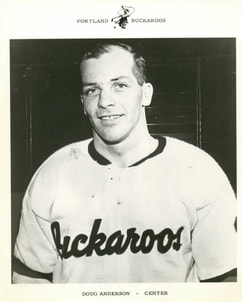 Doug Anderson circa 1962
Doug Anderson circa 1962
Doug "Andy" Anderson's only two NHL games were in the 1953 playoffs, neither in the finals, but his name is on the Stanley Cup. Anderson's first outing came March 26 and a 4-3 victory over Chicago in a semi-finals Montreal won in seven games. He had been called up by the Habs as a precautionary measure for the playoffs after an excellent year in Victoria in the WHL, but after his brief stint with the Canadiens he spent the next decade in the WHL, playing almost 700 games in that minor-pro league.
Anderson began his career in his home town, Edmonton, making it to the Memorial Cup his first year (and losing, in 1945-46) and winning the Allan Cup with the Edmonton Flyers in 1947-48. He moved to Victoria in 1951, and from there he made the big show before retreating to the WHL for the rest of his playing days.
Doug "Andy" Anderson's only two NHL games were in the 1953 playoffs, neither in the finals, but his name is on the Stanley Cup. Anderson's first outing came March 26 and a 4-3 victory over Chicago in a semi-finals Montreal won in seven games. He had been called up by the Habs as a precautionary measure for the playoffs after an excellent year in Victoria in the WHL, but after his brief stint with the Canadiens he spent the next decade in the WHL, playing almost 700 games in that minor-pro league.
Anderson began his career in his home town, Edmonton, making it to the Memorial Cup his first year (and losing, in 1945-46) and winning the Allan Cup with the Edmonton Flyers in 1947-48. He moved to Victoria in 1951, and from there he made the big show before retreating to the WHL for the rest of his playing days.
Roger "The Rocket" Bellerive, Left-Wing # 22, 1968-1971t # 22, 1968-1971
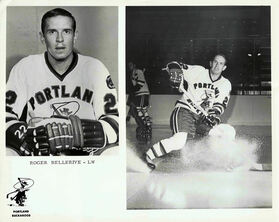 Roger Bellerive, circa 1971
Roger Bellerive, circa 1971
Roger "The Rocket" Bellerive broke into professional hockey player with the St. Louis Braves of the "old" C.H.L. in 1964. Roger would play for the Braves for the next three seasons before moving on to the Dallas Black Hawks in 1967, where he would play for one year, before joining the Portland Buckaroos in 1968. He would play for the Buckaroos from 1968 thru 1971, helping them win the Lester Patrick Cup in 1971 before going to the Salt Lake Eagles where he would remain until the Western Hockey League folded after the close of the 1974 season.
Roger was one of the fastest skaters in pro hockey. While Roger's playing statistics may not be indicative of a hockey superstar, or big goal scorer, his teammates and coaches valued his contributions to the teams he played for over the years. He probably received one of the highest compliments one could get as a player from "The Professor", Hal Laycoe. Hal Laycoe described Roger as a very sensible player who played an intelligent game. Anybody who knew Hal Laycoe could tell you that "The Professor" was not one to praise players, unless he truly felt it was warranted. This compliment was most likely related to the fact that Roger was often tasked with checking top players on the opposing teams, like Willie O'Ree, Norm Johnson and Guyle Fielder. Had Roger not been utilized, and as effective as he was as a checking forward during his career, then it is safe to say that he would have scored many more goals over the course of his career in the Western Hockey League.
During his time with the Buckaroos Roger scored a career high in goals during the 1968-69 season, with twenty-seven (27), which tied him for fourth with Cliff Schmautz, behind Art Jones, Norm Johnson and Bill Saunders. Roger's greatest achievement though as a Buckaroo was being a big part of the 1970-71 Buckaroo team that shattered all Western Hockey League records by winning 48 game over the course of the season and then winning the Lester Patrick Cup as champions of the WHL!
Roger, like many other Portland Buckaroo players settled in Portland after his playing days were over. He had a long and successful career working in the beverage distribution industry. On a personal note, when I asked Roger what he enjoyed most about his time with the Buckaroos, he stated that his fondest memory was being embraced by the city of Portland and the fans.
Roger "The Rocket" Bellerive broke into professional hockey player with the St. Louis Braves of the "old" C.H.L. in 1964. Roger would play for the Braves for the next three seasons before moving on to the Dallas Black Hawks in 1967, where he would play for one year, before joining the Portland Buckaroos in 1968. He would play for the Buckaroos from 1968 thru 1971, helping them win the Lester Patrick Cup in 1971 before going to the Salt Lake Eagles where he would remain until the Western Hockey League folded after the close of the 1974 season.
Roger was one of the fastest skaters in pro hockey. While Roger's playing statistics may not be indicative of a hockey superstar, or big goal scorer, his teammates and coaches valued his contributions to the teams he played for over the years. He probably received one of the highest compliments one could get as a player from "The Professor", Hal Laycoe. Hal Laycoe described Roger as a very sensible player who played an intelligent game. Anybody who knew Hal Laycoe could tell you that "The Professor" was not one to praise players, unless he truly felt it was warranted. This compliment was most likely related to the fact that Roger was often tasked with checking top players on the opposing teams, like Willie O'Ree, Norm Johnson and Guyle Fielder. Had Roger not been utilized, and as effective as he was as a checking forward during his career, then it is safe to say that he would have scored many more goals over the course of his career in the Western Hockey League.
During his time with the Buckaroos Roger scored a career high in goals during the 1968-69 season, with twenty-seven (27), which tied him for fourth with Cliff Schmautz, behind Art Jones, Norm Johnson and Bill Saunders. Roger's greatest achievement though as a Buckaroo was being a big part of the 1970-71 Buckaroo team that shattered all Western Hockey League records by winning 48 game over the course of the season and then winning the Lester Patrick Cup as champions of the WHL!
Roger, like many other Portland Buckaroo players settled in Portland after his playing days were over. He had a long and successful career working in the beverage distribution industry. On a personal note, when I asked Roger what he enjoyed most about his time with the Buckaroos, he stated that his fondest memory was being embraced by the city of Portland and the fans.
Roger "The Rocket" Bellerive broke into professional hockey player with the St. Louis Braves of the "old" C.H.L. in 1964. Roger would play for the Braves for the next three seasons before moving on to the Dallas Black Hawks in 1967, where he would play for one year, before joining the Portland Buckaroos in 1968. He would play for the Buckaroos from 1968 thru 1971, helping them win the Lester Patrick Cup in 1971 before going to the Salt Lake Eagles where he would remain until the Western Hockey League folded after the close of the 1974 season.
Roger was one of the fastest skaters in pro hockey. While Roger's playing statistics may not be indicative of a hockey superstar, or big goal scorer, his teammates and coaches valued his contributions to the teams he played for over the years. He probably received one of the highest compliments one could get as a player from "The Professor", Hal Laycoe. Hal Laycoe described Roger as a very sensible player who played an intelligent game. Anybody who knew Hal Laycoe could tell you that "The Professor" was not one to praise players, unless he truly felt it was warranted. This compliment was most likely related to the fact that Roger was often tasked with checking top players on the opposing teams, like Willie O'Ree, Norm Johnson and Guyle Fielder. Had Roger not been utilized, and as effective as he was as a checking forward during his career, then it is safe to say that he would have scored many more goals over the course of his career in the Western Hockey League.
During his time with the Buckaroos Roger scored a career high in goals during the 1968-69 season, with twenty-seven (27), which tied him for fourth with Cliff Schmautz, behind Art Jones, Norm Johnson and Bill Saunders. Roger's greatest achievement though as a Buckaroo was being a big part of the 1970-71 Buckaroo team that shattered all Western Hockey League records by winning 48 game over the course of the season and then winning the Lester Patrick Cup as champions of the WHL!
Roger, like many other Portland Buckaroo players settled in Portland after his playing days were over. He had a long and successful career working in the beverage distribution industry. On a personal note, when I asked Roger what he enjoyed most about his time with the Buckaroos, he stated that his fondest memory was being embraced by the city of Portland and the fans.
Roger "The Rocket" Bellerive broke into professional hockey player with the St. Louis Braves of the "old" C.H.L. in 1964. Roger would play for the Braves for the next three seasons before moving on to the Dallas Black Hawks in 1967, where he would play for one year, before joining the Portland Buckaroos in 1968. He would play for the Buckaroos from 1968 thru 1971, helping them win the Lester Patrick Cup in 1971 before going to the Salt Lake Eagles where he would remain until the Western Hockey League folded after the close of the 1974 season.
Roger was one of the fastest skaters in pro hockey. While Roger's playing statistics may not be indicative of a hockey superstar, or big goal scorer, his teammates and coaches valued his contributions to the teams he played for over the years. He probably received one of the highest compliments one could get as a player from "The Professor", Hal Laycoe. Hal Laycoe described Roger as a very sensible player who played an intelligent game. Anybody who knew Hal Laycoe could tell you that "The Professor" was not one to praise players, unless he truly felt it was warranted. This compliment was most likely related to the fact that Roger was often tasked with checking top players on the opposing teams, like Willie O'Ree, Norm Johnson and Guyle Fielder. Had Roger not been utilized, and as effective as he was as a checking forward during his career, then it is safe to say that he would have scored many more goals over the course of his career in the Western Hockey League.
During his time with the Buckaroos Roger scored a career high in goals during the 1968-69 season, with twenty-seven (27), which tied him for fourth with Cliff Schmautz, behind Art Jones, Norm Johnson and Bill Saunders. Roger's greatest achievement though as a Buckaroo was being a big part of the 1970-71 Buckaroo team that shattered all Western Hockey League records by winning 48 game over the course of the season and then winning the Lester Patrick Cup as champions of the WHL!
Roger, like many other Portland Buckaroo players settled in Portland after his playing days were over. He had a long and successful career working in the beverage distribution industry. On a personal note, when I asked Roger what he enjoyed most about his time with the Buckaroos, he stated that his fondest memory was being embraced by the city of Portland and the fans.
Gordon "Fash" Fashoway, Left-Wing #11, 1960-1964
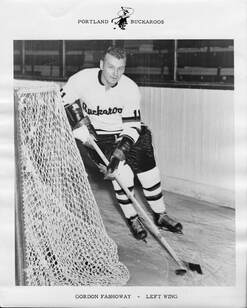 Gordon Fashoway, circa 1962
Gordon Fashoway, circa 1962
Left-Winger Gordon Fashoway signed with the Portland Buckaroos of the old WHL on August 31, 1960. "Fash" as his team mates called him was by then already the 3rd highest goal scorer in hockey history with 450 goals, trailing only Gordie Howe with 468 and Maurice 'The Rocket" Richard with 544. Gordon was familiar with Portland and the fans since he had played for the Portland Eagles in 1950-51.
At 34, the 180-pound veteran was counted on for first-line duty with the Bucks. He had played nine seasons with New Westminster in the old Pacific Coast League before moving to Victoria, while twice leading the league in goals scored. Fashoway broke into hockey with Kansas City in the old United States Hockey League and also played part of one season with the Chicago Black Hawks.
Fashoway's 1st season in Portland produced exactly the results that the Buckaroos hoped for when they signed him as he lead the team with 42 goals and assisted on 32, for a total of 74 points. In addition, it was his leadership and gritty style that helped the Bucks win the Lester Patrick cup. The Western Hockey League rewarded his efforts as the first winner of the new Fred J. Hume trophy (see the trophy by going to my trophies page) as the most gentlemanly player in the Western Hockey League. Fash received the trophy - voted by sports writers for gentlemanly conduct combined with outstanding ability - from league President Al Leader at the Glass Palace (Memorial Coliseum).
On December 12, 1962 Gordon scored his 1000th point as a professional hockey player. He scored the point while driving the puck into the net behind the San Francisco Seals Goaltender, Jim McLeod at 15:47 of the third period. While the Glass Palace fans roared for Fashoway's goal, they really didn't know they were roaring too, for a bit of hockey history. In fact, even Fashoway himself didn't know he had just scored his 1000th point as a pro. When he was told that he had just scored his 1000th point, Fash's reply was "is that so". For Fashoway that was quite the statement since he always let his game speak for itself, rather than tooting his own horn.
On January 1, 1963 Gordon Fashoway announced at a morning conference that he would be retiring at the end of the season, ending a 15-year career as a professional hockey player. Hal Laycoe, went overboard as he lavished praise on Fashoway. Laycoe pointed out that Fashoway had been the only captain the Portland club had ever known and he credited Fash's inspired leadership as a major factor in the Buck's incredible success. The Buckaroo skipper also dipped into the past to reveal Fashoway's value as a player. "Back in 1951, New Westminster purchased Fash from the Chicago Black Hawks for $6500.00, which in those days was an astounding price, perhaps the equivalent of $45,000.00 (in 1963). "Well, all I can say is that it was the greatest investment any hockey club made."
On March 27, 1963 the Portland Buckaroos and their fans honored Fash with "Gordon Fashoway" night. On that night Gordon was presented with a 1963 station wagon from the club and fans that loved him a washer and drier from the team mates that so respected him golf clubs, cash and savings bonds from those who admired him and a wrist watch from his coach Hal Laycoe. Fashoway walked away from the game as the second highest goal scorer in all of professional hockey, with a new job as the first chief scout and director of player development for the Portland Hockey Club. He also received a telegraph of congratulations from the President of the NHL, Clarence Campbell as well as sincere praise from the president of the WHL, Al Leader. That night as he had so many other times, Gordon Fashoway did what he did best. He scored Portland's first goal in a 9-2 victory over Calgary that meant a championship.
When Fashoway final hung up his skates for good at the end of the 1963 season, the 37-year-old native of Manitoba had appeared in over 965 games and had bagged 560 goals (not including his NHL or USHL goals). In addition, Fash's achievements in the WHL were studded with record breaking marks. He had played in 842 regular season games, was the league's all-time top goal manufacturer with 485, scored 20 or more goals in 15 straight seasons, 30 or more goals in 11 seasons, 40 or more goals in six seasons, ranked fourth in points with 812 and seventh in assists with 359. Fash also scored 50 goals in a season twice; 52 with Kansas City in 1949-50 and 52 with New West Minster in 1951-52.
Gordon Fashoway would eventually also take over as the Coach and General Managers of the Portland Buckaroos in 1969 when Hal Laycoe left to take over as coach of the Los Angeles Kings. Fashoway lead the Buckaroos to a Lester Patrick Cup Championship in 1970- 71 before eventually stepping down as coach in 1972.
WHL AWARDS:
WHL (Lester Patrick Cup Championship: 1961
Fred J. Hume Cup (Most Gentlemanly Player): 1961
WHL All Star Selection: Second Team All Star - 1957, 1958, 1961
USHL AWARDS: First Team All-Star - 1950
PCHL AWARDS: First Team All-Star - 1952
Guyle "Guy" Fielder, Center # 11, 1971-1973
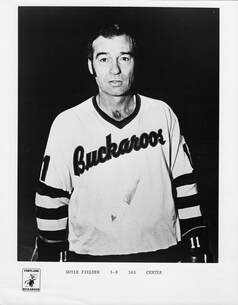 Guyle Fielder, circa 1971
Guyle Fielder, circa 1971
Born in Potlach, Idaho on November 21, 1930 Guyle "Guy" Fielder spent parts of four seasons in the NHL during his twenty-year hockey career. He played three years of junior hockey in Canada and made his NHL debut during his fourth. While with the Lethbridge Native Sons, Fielder suited up with the Chicago Black Hawks for four games.
The next season, Fielder joined the New Westminster Royals of the Pacific Hockey League and was named the Rookie of the Year. In September 1952, the Black Hawks traded Fielder to the Detroit Red Wings, and though he spent the entire regular season in the minors (where he won Rookie of the Year in the American Hockey League), the Wings summoned him for a four game stint during the playoffs.
Almost exactly a year to the day that Red Wings acquired Fielder he was on the move again, this time off to the Boston Bruins. Again, he didn't see any regular season action, but come playoff time the Bruins gave him the call and he played in two contests for them.
For the next three years, Fielder lit up the Western Hockey League, collecting All-Star accolades and piling up points. His hard work in minor pro paid off and he was given another chance at the big leagues. On June 15, 1957 the Bruins dealt Fielder back to the Detroit Red Wings where he played six games that season on a line with Gordie Howe. With him and Howe both being the type of player that wants to control and carry the puck, the chemistry wasn't right. Fielder was released.
They would end up being the last games he'd play as an NHL player. Fielder didn't register a point in the nine regular season and six playoff games he played in the NHL, but he was very prolific in his minor pro career, which continued for many years after his second Red Wing stint was over.
Fielder played 15 more seasons, almost exclusively in the Western Hockey League, seven of those years he led the league in points and ten of those campaigns he was the top assist man in the league. By the time he retired in 1973 at age 42, he had multiple MVPs, Most Gentlemanly Player awards, and All-Star selections to show for his highly successful WHL career.
WHL AWARDS:
WHL (lester Patrick Cup) Championship: 1971;
George Leader Cup (Most Valuable Player Award): 1957, 1958, 1959, 1960 (tied w/Hank Bassen), 1964, 1967
Fred J. Hume Cup (WHL Most Gentlemanly Player): 1966, 1967, 1969)
First Team All Star - 1954, 1957, 1958, 1959, 1960, 1963, 1964, 1967; Second Team All Star - 1961, 1965, 1966, 1968
Rick Foley, Defense # 3, 1968-1971
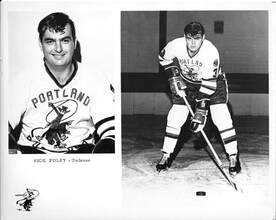 Rick Foley, circa 1970
Rick Foley, circa 1970
Rick Foley was a huge defensemen who played in the NHL and WHA in the early 1970s. The 6'4" 223-pounder was a force in the minors where he played an intimidating physical role and also displayed some offensive ability.
Born in Niagara Falls, Ontario, Foley played Junior B with the St. Thomas Barons and skated in the OHA with the Toronto Marlboros and Oshawa Generals. During the late 1960s he was dominant player in the EHL with the Charlotte Checkers and Jersey Knights. After scoring 175 points in 1968 and 1969, he was named to the EHL south first all-star team both years.
In 1970-71 he played two games with the Chicago Black Hawks but spent most of his time in the WHL with the Portland Buckaroos. He scored 71 points for Portland and led the league with 306 penalty minutes. Prior to the 1972-72, Foley was traded to the Philadelphia Flyers and seemed to find an NHL home with 36 points. His success in Philly was short-lived and he was relegated to the minors in 1972-73 then traded to the Detroit Red Wings. The hulking blueliner played seven games for the Wings in 1973-74 then went to the AHL where he continued to rack up points and penalties.
Foley signed with the WHA's Toronto Toros in June 1975 then played a few games for them the following season. After several years of running into opponents, Foley's body was worn out. He played two years of senior hockey with the Brantford Alexanders then retired in 1978.
WHL AWARDS:
WHL All Star Selection: First All Start Team - 1971
Born in Niagara Falls, Ontario, Foley played Junior B with the St. Thomas Barons and skated in the OHA with the Toronto Marlboros and Oshawa Generals. During the late 1960s he was dominant player in the EHL with the Charlotte Checkers and Jersey Knights. After scoring 175 points in 1968 and 1969, he was named to the EHL south first all-star team both years.
In 1970-71 he played two games with the Chicago Black Hawks but spent most of his time in the WHL with the Portland Buckaroos. He scored 71 points for Portland and led the league with 306 penalty minutes. Prior to the 1972-72, Foley was traded to the Philadelphia Flyers and seemed to find an NHL home with 36 points. His success in Philly was short-lived and he was relegated to the minors in 1972-73 then traded to the Detroit Red Wings. The hulking blueliner played seven games for the Wings in 1973-74 then went to the AHL where he continued to rack up points and penalties.
Foley signed with the WHA's Toronto Toros in June 1975 then played a few games for them the following season. After several years of running into opponents, Foley's body was worn out. He played two years of senior hockey with the Brantford Alexanders then retired in 1978.
WHL AWARDS:
WHL All Star Selection: First All Start Team - 1971
Arlo "Bones" Goodwin, Center # 22, 1967-1971
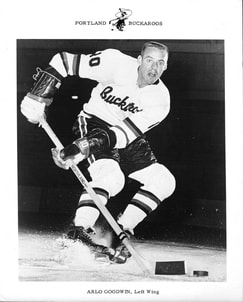 Arlo Goodwin, circa 1962
Arlo Goodwin, circa 1962
You will not find a lot of information on the Internet about Arlo Goodwin, but the following article originally published in Western Hockey World, October 19, 1962 tells a lot about Arlo Goodwin's importance to the Buckaroos:
It was late summer when Arlo Goodwin got the phone call in the oil filter service company where he works in Portland. He had been promised that details of a Buckaroo transaction would be revealed to him just as soon as they could be "leaked". "Arlo" he was told, "the Bucks have just bought Orv Tessier and Tom McCarthy." Goodwin's end of the phone was silent for a few seconds. Then he spoke. "McCarthy", said Goodwin. "he's a Left-winger. And Bill Saunders, he's a left-winger. And Gordie Fashoway, he's a left winger". Goodwin started to add together the staggering total of goals on the left side of the Bucks' front lines. "Hey" he said, "Where does that leave Arlo Goodwin?". "Heck, Arlo," the informant came back. "Portland's gotta have a checker." "With all those goal scorers," shot back Goodwin." Who needs a checker. They'll just win the games 14 to 12."
Actually, the position with the team of Goodwin, who frets and fusses more than any of the Bucks, was never in real danger. It's true that the 160-pounder is a checker-one of the best in all of hockey. He's as bothersome to play against as any guy in the league because he simply never let's up. It's check-check-check. Swarm-swarm-swarm. And it's equally true that he's not the greatest goal scorer in hockey history. He's his the 20-mark only once. In fact, some one was compiling in training camp a list of active players who had scored 50 goals. The list read something like: "Orv Tessier, 54 1961-62…Tom McCarthy, 53, 1961-62…Lou Jankowski, 57, 1960-61…etc…etc…." Then a wag wrote in: "Arlo Goodwin, 51, 1954-62." Some hockey players are great shots. Some are not. And suffice to say that among Arlo's two nicknames with the Bucks, one is "Puffball." (The other is "Bones" because he's broken so many of 'em in his pro career.)
Yet, frequently, overlooked, is the fact that Goodwin has scored some might big goals for the bucks in the two seasons since hockey returned to Portland. One of 'em beat Seattle in the playoffs two years ago in an overtime thriller. And no one ever can take away from Goodwin the eight goals he scored in the playoffs that season to tie with teammate Art Jones for the league leadership. In the Bucks' Western League opener this season, Goodwin set up one goal by stealing the puck from San Francisco and scored another himself on a 25-footer from straight out in front. Not bad for a "checker". Goodwin, it's been noted in some quarters, sometimes has more courage than sense. In a clash with the rough Spokane Comets last season, it was Goodwin who took off after Con Madigan of Roy McBride's crew. Goodwin spotting perhaps 25 pounds, was no match for Connie. Buy he stayed right in there punching. "Someone", he later told Coach Hal Laycoe," had to show those guys."
Goodwin is a product of the Saskatchewan prairies that produced Art Jones and Arnie Schmautz for the Bucks, to say nothing of Coach Laycoe himself. He turned pro with Laycoe at New Westminster, moved to Victoria and finally to Portland with him. Goodwin and his wife, Marcia, a schoolteacher, make their offseason home in Portland. Arlo is perhaps the best of the many Buckaroo bridge players, constantly tries to improve his game by playing with veteran tournament contenders. He's also one of the toughest Buck golfers, hitting his peak summer before last when playing with touring pro Jim Feree in the pro-am preceding the $30,000 Portland Open, he fired a 77 over the championship Columbia-Edgewater layout. And the course was stretched out that day just as long as it could be stretched. "I guess that would be my best when it counted," said Arlo, although shortly after moving to Portland he fired a 30-37-67 on the easier but legitimate Broadmoor course there. Don't play golf with Goodwin, however, unless you're prepared to run - not walk - around the course. He takes off after each shot like a bird dog after it's quarry.
On a team loaded with goal scorers, Goodwin could be even more valuable to the Buckaroos this season than last. His forechecking and backchecking constantly keep opponents off balance, and he's one of the league's top penalty killers. Furthermore, he'll throw in those odd goals, too, frequently when they're needed the most. Heck, if he could just stay healthy for an entire season, he might even hit the 20 mark again.
It was late summer when Arlo Goodwin got the phone call in the oil filter service company where he works in Portland. He had been promised that details of a Buckaroo transaction would be revealed to him just as soon as they could be "leaked". "Arlo" he was told, "the Bucks have just bought Orv Tessier and Tom McCarthy." Goodwin's end of the phone was silent for a few seconds. Then he spoke. "McCarthy", said Goodwin. "he's a Left-winger. And Bill Saunders, he's a left-winger. And Gordie Fashoway, he's a left winger". Goodwin started to add together the staggering total of goals on the left side of the Bucks' front lines. "Hey" he said, "Where does that leave Arlo Goodwin?". "Heck, Arlo," the informant came back. "Portland's gotta have a checker." "With all those goal scorers," shot back Goodwin." Who needs a checker. They'll just win the games 14 to 12."
Actually, the position with the team of Goodwin, who frets and fusses more than any of the Bucks, was never in real danger. It's true that the 160-pounder is a checker-one of the best in all of hockey. He's as bothersome to play against as any guy in the league because he simply never let's up. It's check-check-check. Swarm-swarm-swarm. And it's equally true that he's not the greatest goal scorer in hockey history. He's his the 20-mark only once. In fact, some one was compiling in training camp a list of active players who had scored 50 goals. The list read something like: "Orv Tessier, 54 1961-62…Tom McCarthy, 53, 1961-62…Lou Jankowski, 57, 1960-61…etc…etc…." Then a wag wrote in: "Arlo Goodwin, 51, 1954-62." Some hockey players are great shots. Some are not. And suffice to say that among Arlo's two nicknames with the Bucks, one is "Puffball." (The other is "Bones" because he's broken so many of 'em in his pro career.)
Yet, frequently, overlooked, is the fact that Goodwin has scored some might big goals for the bucks in the two seasons since hockey returned to Portland. One of 'em beat Seattle in the playoffs two years ago in an overtime thriller. And no one ever can take away from Goodwin the eight goals he scored in the playoffs that season to tie with teammate Art Jones for the league leadership. In the Bucks' Western League opener this season, Goodwin set up one goal by stealing the puck from San Francisco and scored another himself on a 25-footer from straight out in front. Not bad for a "checker". Goodwin, it's been noted in some quarters, sometimes has more courage than sense. In a clash with the rough Spokane Comets last season, it was Goodwin who took off after Con Madigan of Roy McBride's crew. Goodwin spotting perhaps 25 pounds, was no match for Connie. Buy he stayed right in there punching. "Someone", he later told Coach Hal Laycoe," had to show those guys."
Goodwin is a product of the Saskatchewan prairies that produced Art Jones and Arnie Schmautz for the Bucks, to say nothing of Coach Laycoe himself. He turned pro with Laycoe at New Westminster, moved to Victoria and finally to Portland with him. Goodwin and his wife, Marcia, a schoolteacher, make their offseason home in Portland. Arlo is perhaps the best of the many Buckaroo bridge players, constantly tries to improve his game by playing with veteran tournament contenders. He's also one of the toughest Buck golfers, hitting his peak summer before last when playing with touring pro Jim Feree in the pro-am preceding the $30,000 Portland Open, he fired a 77 over the championship Columbia-Edgewater layout. And the course was stretched out that day just as long as it could be stretched. "I guess that would be my best when it counted," said Arlo, although shortly after moving to Portland he fired a 30-37-67 on the easier but legitimate Broadmoor course there. Don't play golf with Goodwin, however, unless you're prepared to run - not walk - around the course. He takes off after each shot like a bird dog after it's quarry.
On a team loaded with goal scorers, Goodwin could be even more valuable to the Buckaroos this season than last. His forechecking and backchecking constantly keep opponents off balance, and he's one of the league's top penalty killers. Furthermore, he'll throw in those odd goals, too, frequently when they're needed the most. Heck, if he could just stay healthy for an entire season, he might even hit the 20 mark again.
Jim "Red-Eye" Hay, Defense # 23, 1964-1970
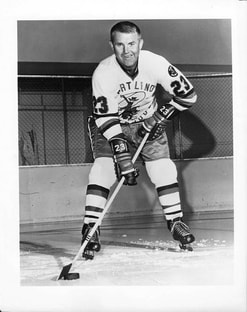 Jim Hay, circa 1966
Jim Hay, circa 1966
Defensemen Jim Hay spent parts of three seasons with the Detroit Red Wings in the early 50s. He was a punishing hitter in his own zone and could move the puck up ice with efficiency. The majority of his long pro career was spent in the minors, particularly the Western League.
Born in Saskatoon, Saskatchewan, Hay played junior with the OHA's Windsor Spitfires. He spent the early part of his pro career jumping from the IHL to the USHL then the AHL. He scored 24 goals for the Omaha Knights in 1950-51 and was voted on to the USHL second all-star team. In 1952-53 he was a solid addition to the Detroit Red Wings' blueline and was on hand when the club lost to the Boston Bruins in the semifinals. Over the next two seasons he was a utility player on the club and played more games in the minors. Hay was recalled in time for the 1955 post-season and scored a goal while helping the Motowners win the Stanley Cup.
Beginning in 1955-56, Hay spent 14 of the next 15 seasons in the WHL and helped the Portland Buckaroos win a league championship in 1965. In the early 70's he joined the Jersey Devils for parts of two seasons before retiring in 1972. Hay then stepped behind the club's bench as a head coach in 1972-73 before stepping away from the game.
USHL AWARDS:
USHL All Star Selections: Second Team All Star - 1951
Jim also settled in Portland like so many of the other Buckaroos did.
Born in Saskatoon, Saskatchewan, Hay played junior with the OHA's Windsor Spitfires. He spent the early part of his pro career jumping from the IHL to the USHL then the AHL. He scored 24 goals for the Omaha Knights in 1950-51 and was voted on to the USHL second all-star team. In 1952-53 he was a solid addition to the Detroit Red Wings' blueline and was on hand when the club lost to the Boston Bruins in the semifinals. Over the next two seasons he was a utility player on the club and played more games in the minors. Hay was recalled in time for the 1955 post-season and scored a goal while helping the Motowners win the Stanley Cup.
Beginning in 1955-56, Hay spent 14 of the next 15 seasons in the WHL and helped the Portland Buckaroos win a league championship in 1965. In the early 70's he joined the Jersey Devils for parts of two seasons before retiring in 1972. Hay then stepped behind the club's bench as a head coach in 1972-73 before stepping away from the game.
USHL AWARDS:
USHL All Star Selections: Second Team All Star - 1951
Jim also settled in Portland like so many of the other Buckaroos did.
Don Head, Goaltender # 1, 1960-1967 & 1971-1972
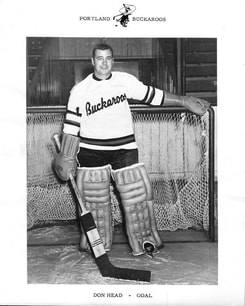 Don Head, circa 1960
Don Head, circa 1960
Goaltender Don Head was a highly decorated, multiple All-Star in the Western Hockey League but he also spent a single season in the National Hockey League. Head played Senior hockey in Stratford and Windsor, then moved on to the Northern Ontario Hockey Association for two years before rejoining Windsor for another season of Senior play. That season he also joined Team Canada for the 1960 Olympic Winter Games in Squaw Valley, California.Head's solid play back stopped the Canadiens to a 5-1 record and a silver medal.
His rock solid netminding earned him a contract offer from the WHL's Portland Buckaroos for the 1960-61 campaign. Head enjoyed a banner year his first season in Portland by leading the league in games played, wins, shutouts and goals against average. He was named rookie of the year, goaltender of the year and First Team All-Star for efforts. He then capped his amazing season by winning ten more games in the playoffs and adding two more shutouts en route to leading his team to a championship title.
The Bruins, who were using Portland as a farm team, decided they liked what they saw in the young goaltender and made a deal to bring him to Beantown.The 1961-62 season saw Head become a starter in the National Hockey League, though the lowly Bruins weren't the ideal franchise to break in with. While Head stole the starting job from incumbent Bruce Gamble, he wasn't able to do much with the role posting just nine victories in his 38 starts. At the end of the season, the Bruins dealt Head back to the Buckaroos and his NHL career was over.
Back in Portland Head picked up exactly where he left off. He better his win total from his rookie year when he once again led the league with 43 victories. Once again he was a First Team All-Star and he repeated as the league's top netminder. For the next four years Head was a star for the Buckaroos before he left the team to join the Seattle Totems in 1967.
Head was very successful during his first year with the Totems earning his third and final First All-Star berth, though the 1967-68 season would prove to be his last hurrah. Though he had one more solid year with Seattle, his numbers began to slip. During his final two years with the club he was relegated to a back-up role and managed just 12 wins over his final two seasons before hanging up his goal pads following the 1970-71 campaign.
WHL AWARDS:
WHL Rookie of The Year: 1960-1961
WHL Leading Goaltender Award: 1960-1961, 1962-1963, 1960-1965
WHL All Star Selection: First Team All Star - 1961, 1963, 1968; Second Team All Star - 1965, 1966
Don as so many of the other Buckaroos settled in Portland after his playing days were over.
His rock solid netminding earned him a contract offer from the WHL's Portland Buckaroos for the 1960-61 campaign. Head enjoyed a banner year his first season in Portland by leading the league in games played, wins, shutouts and goals against average. He was named rookie of the year, goaltender of the year and First Team All-Star for efforts. He then capped his amazing season by winning ten more games in the playoffs and adding two more shutouts en route to leading his team to a championship title.
The Bruins, who were using Portland as a farm team, decided they liked what they saw in the young goaltender and made a deal to bring him to Beantown.The 1961-62 season saw Head become a starter in the National Hockey League, though the lowly Bruins weren't the ideal franchise to break in with. While Head stole the starting job from incumbent Bruce Gamble, he wasn't able to do much with the role posting just nine victories in his 38 starts. At the end of the season, the Bruins dealt Head back to the Buckaroos and his NHL career was over.
Back in Portland Head picked up exactly where he left off. He better his win total from his rookie year when he once again led the league with 43 victories. Once again he was a First Team All-Star and he repeated as the league's top netminder. For the next four years Head was a star for the Buckaroos before he left the team to join the Seattle Totems in 1967.
Head was very successful during his first year with the Totems earning his third and final First All-Star berth, though the 1967-68 season would prove to be his last hurrah. Though he had one more solid year with Seattle, his numbers began to slip. During his final two years with the club he was relegated to a back-up role and managed just 12 wins over his final two seasons before hanging up his goal pads following the 1970-71 campaign.
WHL AWARDS:
WHL Rookie of The Year: 1960-1961
WHL Leading Goaltender Award: 1960-1961, 1962-1963, 1960-1965
WHL All Star Selection: First Team All Star - 1961, 1963, 1968; Second Team All Star - 1965, 1966
Don as so many of the other Buckaroos settled in Portland after his playing days were over.
Andy "Handy Andy" Hebenton, Right -Wing # 14, 1964-65 & 1967-1974
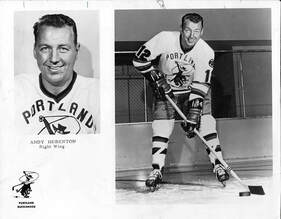 Andy Hebenton, Circa 1967
Andy Hebenton, Circa 1967
They called him "Handy Andy" and Andy Hebenton was, indeed, that and more. Hebenton was a plugging right winger and great contributor for eight Rangers seasons, from 1955-56 through 1962-63. Always a durable sort, Hebenton never missed a game, not a single one, while with the Blueshirts.
I never thought of it at the time, but I guess it is quite something by today's standards, he noted years after his playing career ended. I just showed up every day and tried to do my job. One thing I know for sure is that I really enjoyed my time in New York.
Rangers fans enjoyed Andy too. He won the Lady Byng Trophy for clean, effective play in 1956-57 and captured the first three Players Player Awards in team history in 1959, 1960 and 1961. Andy was the perfect team player, recalled Red Sullivan, the Rangers's Captain for most of Hebenton's career and later the club's coach. He didn't say a whole lot, but he led by example, and he never missed a game. That was really something. Hebenton was usually paired on the Rangers second line with Sullivan at center and Camille Henry on left wing. He averaged more than 20 goals a season, scoring 177 times in eight years, and was a solid defensive forward and penalty killer as well. Hebenton played 560 consecutive games for the Blueshirts, plus 22 more in the Stanley Cup Playoffs. The 582-game streak stands as the Rangers all-time record, surpassing by 19 the oft-chronicled streak by Original Ranger and the team's first Iron Man, Murray Murdoch.
The Rangers lost Hebenton's services in June of 1963, when the Boston Bruins grabbed him in what was then called the Intra-League Draft. He played one season for the Bruins all 70 games of course before returning to the Western Hockey League, where he finished his professional career in 1975. All told, Hebenton played 1,062 games as a pro without a single miss. It was the death of his father that finally snapped the streak on October 18, 1967.
Andy, like many other Portland Buckaroo players settled in Portland after his playing days were over.
NHL AWARDS: Lady Byng Memorial Trophy (Most Gentlemanly Player) - 1957, All Star - 1960
WHL AWARDS:
WHL (Lester Patrick Cup) Championship: 1964-1965, 1970-1971
Fred J. Hume Cup (Most Gentlemanly Player): 1965, 1970, 1971, 1972, 1973, 1974;
WHL All Star Selection: First Team All Star - 1971, 1973; Second Team All Star - 1955, 1965, 1970.
I never thought of it at the time, but I guess it is quite something by today's standards, he noted years after his playing career ended. I just showed up every day and tried to do my job. One thing I know for sure is that I really enjoyed my time in New York.
Rangers fans enjoyed Andy too. He won the Lady Byng Trophy for clean, effective play in 1956-57 and captured the first three Players Player Awards in team history in 1959, 1960 and 1961. Andy was the perfect team player, recalled Red Sullivan, the Rangers's Captain for most of Hebenton's career and later the club's coach. He didn't say a whole lot, but he led by example, and he never missed a game. That was really something. Hebenton was usually paired on the Rangers second line with Sullivan at center and Camille Henry on left wing. He averaged more than 20 goals a season, scoring 177 times in eight years, and was a solid defensive forward and penalty killer as well. Hebenton played 560 consecutive games for the Blueshirts, plus 22 more in the Stanley Cup Playoffs. The 582-game streak stands as the Rangers all-time record, surpassing by 19 the oft-chronicled streak by Original Ranger and the team's first Iron Man, Murray Murdoch.
The Rangers lost Hebenton's services in June of 1963, when the Boston Bruins grabbed him in what was then called the Intra-League Draft. He played one season for the Bruins all 70 games of course before returning to the Western Hockey League, where he finished his professional career in 1975. All told, Hebenton played 1,062 games as a pro without a single miss. It was the death of his father that finally snapped the streak on October 18, 1967.
Andy, like many other Portland Buckaroo players settled in Portland after his playing days were over.
NHL AWARDS: Lady Byng Memorial Trophy (Most Gentlemanly Player) - 1957, All Star - 1960
WHL AWARDS:
WHL (Lester Patrick Cup) Championship: 1964-1965, 1970-1971
Fred J. Hume Cup (Most Gentlemanly Player): 1965, 1970, 1971, 1972, 1973, 1974;
WHL All Star Selection: First Team All Star - 1971, 1973; Second Team All Star - 1955, 1965, 1970.
Norm "Normie" Johnson, Center # 22, 1967-1971
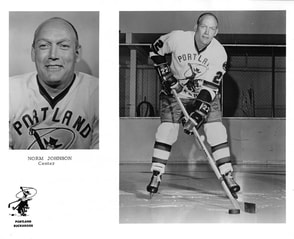 Norm Johnson, circa 1970
Norm Johnson, circa 1970
Norm Johnson spent nearly two decades in the WHL and was one of the most prolific scorers in the history of the Western Hockey League even though he started his career as a defenseman! He also ranks third all-time in total points scored in WHL history with 1082 points (391 goals, 691 assists). At the time Norm scored his 1000th point, he was one of only seven hockey players in all of professional hockey to have surpassed the 1000 point mark.
Norm Johnson only decided to pursue hockey as a career after being literally a few feet away from joining the Royal Canadian Mounted Police in Moose Jaw where he was intending to apply. Hailing from Moose Jaw, Saskatchewan, Johnson played for the home town Canucks from 1949 to 1954. He played 22 games in the IHL for the Fort Wayne Komets in 1954-55 before joining the WHL's Brandon Regals the following seasons. Norm was drafted by the Boston Bruins following his first season with Brandon. Then in 1956-57 he scored 78 points in 70 games and was named to the Prairie Division second all-star team. His outstanding performance with the Regals then resulted in him getting a call-up to the Bruins in 1957-58. He played fairly well in a 15-game trial then played 39 games the following season for the Bruins as well. Part way through the year though he was claimed on waivers by the Black Hawks. Norm then worked in seven regular season games in 1958-59 with the hawks and was an emergency call up for two games in the 1960 semi-finals.
Then came the 1960's, an era in which Norm dominated the WHL and established himself as one of the best Centers to ever play the game of hockey. He spent most of his WHL career with three teams - the Calgary Stampeders (1960-63), the Los Angeles Blades (1963-1967) and finally the Portland Buckaroos (1967-1971). During these years Norm had 11 consecutive seasons in which he scored 20 or more goals (setting a career high of 43 goals in 1968-69) and topped the 80 point mark more than eight times with a high of 96 points in 1970. He also centered a line with Lou Jankowski and Ron Leopold in 1963 that set a WHL record of 278 points for three players. In addition, he led the league in assists once, and was a two-time selection to the WHL first all-star team. Norm also played on two WHL Championship teams, the 1956-57 Brandon Regals and 1970-71 Portland Buckaroos. He then hung up his skates and retired after the 1971 season and went into coaching with the Spokane Jets.
WHL AWARDS:
WHL (Lester Patrick Cup) Championship: 1956-1957 (Brandon Regals), 1970-1971 (Portland Buckaroos)
WHL ALL SPrairie Division Second Team All-Star - 1957); WHL First Team All-Star Team - 1961, 1962; WHL Second Team All-Star Team - 1969
Norm, like many other Portland Buckaroos players then settled in Portland after his playing days were over.
Norm Johnson only decided to pursue hockey as a career after being literally a few feet away from joining the Royal Canadian Mounted Police in Moose Jaw where he was intending to apply. Hailing from Moose Jaw, Saskatchewan, Johnson played for the home town Canucks from 1949 to 1954. He played 22 games in the IHL for the Fort Wayne Komets in 1954-55 before joining the WHL's Brandon Regals the following seasons. Norm was drafted by the Boston Bruins following his first season with Brandon. Then in 1956-57 he scored 78 points in 70 games and was named to the Prairie Division second all-star team. His outstanding performance with the Regals then resulted in him getting a call-up to the Bruins in 1957-58. He played fairly well in a 15-game trial then played 39 games the following season for the Bruins as well. Part way through the year though he was claimed on waivers by the Black Hawks. Norm then worked in seven regular season games in 1958-59 with the hawks and was an emergency call up for two games in the 1960 semi-finals.
Then came the 1960's, an era in which Norm dominated the WHL and established himself as one of the best Centers to ever play the game of hockey. He spent most of his WHL career with three teams - the Calgary Stampeders (1960-63), the Los Angeles Blades (1963-1967) and finally the Portland Buckaroos (1967-1971). During these years Norm had 11 consecutive seasons in which he scored 20 or more goals (setting a career high of 43 goals in 1968-69) and topped the 80 point mark more than eight times with a high of 96 points in 1970. He also centered a line with Lou Jankowski and Ron Leopold in 1963 that set a WHL record of 278 points for three players. In addition, he led the league in assists once, and was a two-time selection to the WHL first all-star team. Norm also played on two WHL Championship teams, the 1956-57 Brandon Regals and 1970-71 Portland Buckaroos. He then hung up his skates and retired after the 1971 season and went into coaching with the Spokane Jets.
WHL AWARDS:
WHL (Lester Patrick Cup) Championship: 1956-1957 (Brandon Regals), 1970-1971 (Portland Buckaroos)
WHL ALL SPrairie Division Second Team All-Star - 1957); WHL First Team All-Star Team - 1961, 1962; WHL Second Team All-Star Team - 1969
Norm, like many other Portland Buckaroos players then settled in Portland after his playing days were over.
Art "The Red Baron" Jones, Center # 15, 1960-1974 Center # 15, 1960-1974
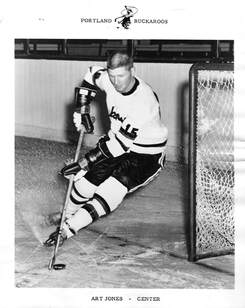 Art Jones, circa 1960
Art Jones, circa 1960
A flat-out scorer, Art Jones terrorized WHL netminders for 18 seasons. Art earned the nickname "Red Baron" during his playing days with the Portland Buckaroos of the old Western Hockey League. If you ask why, it is due to the fact that Art was as deadly at scoring goals as Red Baron was at shooting enemy fighters down in World War I.
During his career he broke the 100-point mark six times including a WHL record 127 points during the 1969-70 season. Art reigns as the All-Time WHL Goal Scoring Champ with 578 goals in regular season play then add in another 59 goals in the Playoffs; 978 assists in the regular season and 90 assists in the Playoffs and you have a guy that accumulated 1705 points during his WHL career. That not only ranks Art as 2nd in totals points in the history of the WHL (behind Guyle Fielder), that also ranks him as one of the best scoring players in the history of the game of hockey! However, if you asked Art Jones why or how he accumulated all those points, all he would says is "I was just doing my job".
Jones was a product of Bangor, Sask., the only hockey player in a family with six sisters and two brothers. He played Junior hockey in Saskatoon, was with Spokane for two seasons as an amateur before turning pro with New Westminster in 1957. It was Hal Laycoe "The Professor" who lured Art into the pro fold after seeing him play amateur hockey for the Spokane Flyers and score 50 goals in one season. Hal Laycoe was the coach of the New Westminster Royals at that time and was always looking for guys who could score. The Oregonian in March 1961 ran a story on Jones that said that Laycoe would gleefully slap his side, flash a wide grin and shout: "I knew it! I knew it!" every time Art would put the puck into an enemy net. That is due to the fact that many scouts doubted that Art would make it as a professional. See, Art made it look easy when he played the game and scored goals so they thought he was slacking or not giving it his all. However, a few years after being in the WHL, the local paper ran a story in which the following statement was made: "Art Jones wastes no time with wild rink long dashes, that wind up nowhere. When Jones makes a move it counts." Art himself put it this way "I try to set up my wings and I try to get in position to score myself."
Art came to Portland via the New Westminster Royals and Victoria Cougars who then became the Portland Buckaroos in 1960. Art would remain a Buckaroo until the WHL folded in 1974.
In conclusion, I want to say that Art Jones may have never made it to the NHL, mainly due to politics and his drawing power for the Western Hockey League, but that never mattered to the fans that were fortunate enough to get to see Art play the game of hockey. In their eyes Art was (and will always be) a true Superstar!
WHL AWARDS:
WHL (Lester Patrick Cup) Championship: 1961, 1965 and 1971
WHL Leading Scorer: 1961, 1969, 1970, 1971 and 1972
George Leader Cup (Most Valuable Player) Award: 1968 and 1971
WHL All Star selection:
WHL Scoring Record For Most Points In A Season: (127) - 1970
Art Jones like many of the other Buckaroo players settled in Portland after his playing days were over.
During his career he broke the 100-point mark six times including a WHL record 127 points during the 1969-70 season. Art reigns as the All-Time WHL Goal Scoring Champ with 578 goals in regular season play then add in another 59 goals in the Playoffs; 978 assists in the regular season and 90 assists in the Playoffs and you have a guy that accumulated 1705 points during his WHL career. That not only ranks Art as 2nd in totals points in the history of the WHL (behind Guyle Fielder), that also ranks him as one of the best scoring players in the history of the game of hockey! However, if you asked Art Jones why or how he accumulated all those points, all he would says is "I was just doing my job".
Jones was a product of Bangor, Sask., the only hockey player in a family with six sisters and two brothers. He played Junior hockey in Saskatoon, was with Spokane for two seasons as an amateur before turning pro with New Westminster in 1957. It was Hal Laycoe "The Professor" who lured Art into the pro fold after seeing him play amateur hockey for the Spokane Flyers and score 50 goals in one season. Hal Laycoe was the coach of the New Westminster Royals at that time and was always looking for guys who could score. The Oregonian in March 1961 ran a story on Jones that said that Laycoe would gleefully slap his side, flash a wide grin and shout: "I knew it! I knew it!" every time Art would put the puck into an enemy net. That is due to the fact that many scouts doubted that Art would make it as a professional. See, Art made it look easy when he played the game and scored goals so they thought he was slacking or not giving it his all. However, a few years after being in the WHL, the local paper ran a story in which the following statement was made: "Art Jones wastes no time with wild rink long dashes, that wind up nowhere. When Jones makes a move it counts." Art himself put it this way "I try to set up my wings and I try to get in position to score myself."
Art came to Portland via the New Westminster Royals and Victoria Cougars who then became the Portland Buckaroos in 1960. Art would remain a Buckaroo until the WHL folded in 1974.
In conclusion, I want to say that Art Jones may have never made it to the NHL, mainly due to politics and his drawing power for the Western Hockey League, but that never mattered to the fans that were fortunate enough to get to see Art play the game of hockey. In their eyes Art was (and will always be) a true Superstar!
WHL AWARDS:
WHL (Lester Patrick Cup) Championship: 1961, 1965 and 1971
WHL Leading Scorer: 1961, 1969, 1970, 1971 and 1972
George Leader Cup (Most Valuable Player) Award: 1968 and 1971
WHL All Star selection:
WHL Scoring Record For Most Points In A Season: (127) - 1970
Art Jones like many of the other Buckaroo players settled in Portland after his playing days were over.
Dennis Kearns, Defense # 5, 1967-1970
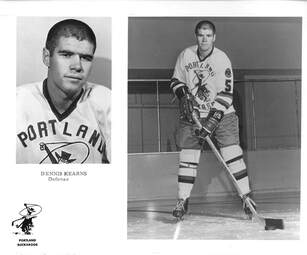 Dennis Kearns, circa 1968
Dennis Kearns, circa 1968
Dennis Kearns was an excellent puck-moving defensemen with a good shot from the point who spent his entire ten-year NHL career with the Vancouver Canucks. He was useful on the power-play and with the team's transition game but he needed to be paired with someone who would stay back when Kearns embarked on one of his rushes or was pinching in at the blueline.
Kearns played junior with the home town Kingston Canadiens of the OHA in 1965-66 then spent a year with the city's senior Aces. Originally property of the Chicago Black Hawks, Kearns was a stalwart in WHL with the Portland Buckaroos from 1967 to 1970. He scored 117 points in three years and was voted on to the league's second all-star team 1969 and the first all-star squad in 1970. Kearns then spent the 1970-71 season with the CHL's Dallas Black Hawks where he scored 52 points and was named to the league's first all-star team.
Around this time Chicago was deep on defence and decided to expose Kearns in the Intra-League Draft. He was claimed by Vancouver on June 8, 1971 and embarked on a successful 677-game career. The young blueliner scored 29 points for the Canucks as a rookie in 1971-72 and became a fixture on the team's defense. During this period he was often paired with Dale Tallon or John Schella. Offensively Kearns put up his most impressive numbers between 1975 and 1978 when he recorded 158 points in those three years. He registered 60 points in 1976-77, a team record until Doug Lidster broke it with a 63-point effort in 1986-87.
Kearns mobility and offensive savvy were sought by Team Canada at the 1977 and 1978 World Championships. By the 1979-80 season, Kearns was slowing down and the team was giving Lars Lindgren and Kevin McCarthy more ice time and power play work. The veteran rear guard retired after playing 46 games in 1980-81.
WHL AWARDS:
WHL All Star Selection: First Team All Star - 1970; Second Team All Star - 1969
CHL AWARDS: First Team All Star - 1971
Kearns played junior with the home town Kingston Canadiens of the OHA in 1965-66 then spent a year with the city's senior Aces. Originally property of the Chicago Black Hawks, Kearns was a stalwart in WHL with the Portland Buckaroos from 1967 to 1970. He scored 117 points in three years and was voted on to the league's second all-star team 1969 and the first all-star squad in 1970. Kearns then spent the 1970-71 season with the CHL's Dallas Black Hawks where he scored 52 points and was named to the league's first all-star team.
Around this time Chicago was deep on defence and decided to expose Kearns in the Intra-League Draft. He was claimed by Vancouver on June 8, 1971 and embarked on a successful 677-game career. The young blueliner scored 29 points for the Canucks as a rookie in 1971-72 and became a fixture on the team's defense. During this period he was often paired with Dale Tallon or John Schella. Offensively Kearns put up his most impressive numbers between 1975 and 1978 when he recorded 158 points in those three years. He registered 60 points in 1976-77, a team record until Doug Lidster broke it with a 63-point effort in 1986-87.
Kearns mobility and offensive savvy were sought by Team Canada at the 1977 and 1978 World Championships. By the 1979-80 season, Kearns was slowing down and the team was giving Lars Lindgren and Kevin McCarthy more ice time and power play work. The veteran rear guard retired after playing 46 games in 1980-81.
WHL AWARDS:
WHL All Star Selection: First Team All Star - 1970; Second Team All Star - 1969
CHL AWARDS: First Team All Star - 1971
Dave "The Snake" Kelly, Goaltender # 1/30, 1963-1966 & 1968-1974
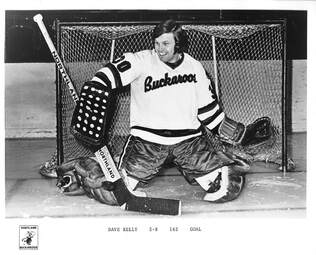 Dave Kelly, circa 1970
Dave Kelly, circa 1970
DAVE "The Snake" KELLY came to the Portland Buckaroos training camp in the summer of 1963 from the Knob Hill Farms of the Toronto Metro Junior "A" League. As Coach Laycoe put it, "known only as a kid with a mask." Dave was brought to Portland, frankly, simply as a practice goalie until he could be placed with an amateur team for the season. The Bucks tried to place him but by the time they got around to it, there wasn't an amateur club that wanted a goalie. So, Dave had to fight for a spot with Rick Charron since Don Head was the undisputed # 1 goalie for the Buckaroos. However all that changed on Oct. 30, 1963 when Dave replaced Don Head in the Portland Buckaroos net against the San Francisco Seals and promptly shut them out. Don Head needed surgery on his knee and suddenly the 20-year-old was a pro. At the time Dave started his first game in net for the Buckaroos, he was the youngest goalie in professional hockey at age 20. He was so nervous after his first game that a cold shower wouldn't stop the flow of perspiration from his forehead. Yet, he was so cocky that he flatly predicted on a southern swing: " In L.A., I'll lead the way, with a shutout every day." And then he blanked the Blades 1-0 in his next game. After that the writer for the Oregonian, John White would refer to Dave in his "Buck Shots" articles as Dave (Cassius) Kelly from then on.
Kelly by then had already been the subject of a full-length feature in the Toronto Star in which he was mentioned as the possible future goalie of the Toronto Maple Leafs. Laycoe agreed with the possibility by saying - "judging him against other 20-year olds". How many goalies have made it in pro hockey at the age of 20?" Dave would rise to the challenge as he would finish the 1963-64 season with the second lowest goals-against average in the Western Hockey League. He also rewrote the WHL record books by posting a shutout streak of 225 minutes and 22 seconds that came to an end on March 15, 1964. Dave was also chosen the WHL Rookie of the Year for 1964.
In 1964-65 Dave posted a 3.21 goals-against average and in 1965-66 he had a 3.19 average and shared the leading WHL goal keeper award with teammate Don Head.
However, in 1966 he was traded with Tommy McVie to the L.A. Blades for Right-Winger, Willie O'Ree. Laycoe's reasoning for trading Dave was that Kelly's NHL rights were owned by the Toronto Maple Leafs and there was a good chance that the Bucks would lose him in the expansion draft. Dave once again was up to the challenge and played solid in L.A. posting a 4.00 goals-against average with 2 shutouts for the Blades.
The Buckaroos then sold Dave to the San Diego Gulls in 1968 and Dave played in 41 games and had his best ever goals-against average of 2.88 along with 2 shutouts. However, at the start of the following season the Gulls drafted Jack McCartan and the Buckaroos once again came calling. Dave Kelly was once again a Portland Buckaroo.
WHL AWARDS:
WHL (Lester Patrick Cup) Championship:
WHL Rookie Of The year: 1963-1964
WHL Leading Goaltender Award: 1965-1966 (shared with Don Head, 1968-1969, 1970-1971 (shared with Jim Mcleod).
WHL Record Shoutout Streak: 225 Minutes and 22 Seconds, 1964
Dave Kelly, as so many other Portland Buckaroos players settled in Portland after his career was over.
Larry Leach, Center # 19/6, 1960-61 & 1964-1973
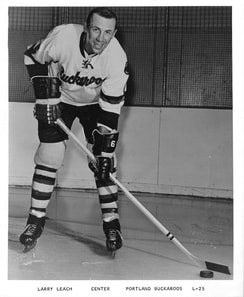 Larry Leach, circa 1970
Larry Leach, circa 1970
Centre Larry Leach spent parts of three years with the Boston Bruins in the 50's and 60's. He was a solid worker who could check and create scoring opportunities especially during a productive career in the Western Hockey League. Born in Lloydminster, Saskatchewan, Leach was a junior standout with the Humboldt Indians of the SJHL.
He began his pro career with the WHL's Victoria Cougars and later spent a year with the Springfield Indians of the AHL before scoring 16 points in 29 games for Boston in 1958-59. The next year he recorded 19 points and was a useful checker on a line with Dick Meissner and Fleming Mackell.
In 1961-62 Leach split his playing time between Boston and the Providence Reds of the AHL before he was relegated to the minors for the remainder of his career. The solid forward was a regular on the WHL's Portland Buckaroos between 1964-65 and 1972-73. He helped the club win league championships in 1965 and 1971 while hitting double figures in goals four times. After retiring in 1973 Leach spent a year coaching SJHL's Lloydminster Blazers.
WHL AWARDS:
WHL (Lester Patrick Cup) Championship: 1965 and 1971
Centre Larry Leach spent parts of three years with the Boston Bruins in the 50's and 60's. He was a solid worker who could check and create scoring opportunities especially during a productive career in the Western Hockey League. Born in Lloydminster, Saskatchewan, Leach was a junior standout with the Humboldt Indians of the SJHL.
He began his pro career with the WHL's Victoria Cougars and later spent a year with the Springfield Indians of the AHL before scoring 16 points in 29 games for Boston in 1958-59. The next year he recorded 19 points and was a useful checker on a line with Dick Meissner and Fleming Mackell.
In 1961-62 Leach split his playing time between Boston and the Providence Reds of the AHL before he was relegated to the minors for the remainder of his career. The solid forward was a regular on the WHL's Portland Buckaroos between 1964-65 and 1972-73. He helped the club win league championships in 1965 and 1971 while hitting double figures in goals four times. After retiring in 1973 Leach spent a year coaching SJHL's Lloydminster Blazers.
WHL AWARDS:
WHL (Lester Patrick Cup) Championship: 1965 and 1971
Connie "Con" Madigan, Defense # 2/26, 1964-1974
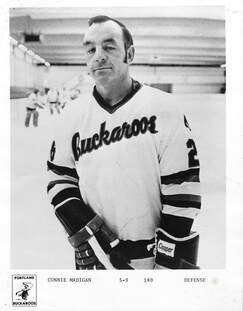 Connie Madigan, circa 1972
Connie Madigan, circa 1972
Connie Madigan must have doubted that he would ever play in the NHL. After playing junior hockey with his home town Port Arthur Bruins, he embarked on a hockey Odyssey that took him to Penticton, Vernon, Nelson, Spokane, Fort Wayne, Cleveland, Los Angeles, Providence, Portland, and Dallas before he got his big break in 1973 at the age of 38. Connie was the oldest rookie ever to play in the NHL with St. Louis.
In fact, his coach, Jean-Guy Talbot, was only two years older than Madigan and had been retired for two seasons after a 16-year career. Some of his St.Louis Blues team mates had not been born when Madigan began his professional hockey career. Nonetheless, he was ecstatic to get the opportunity to play.
It is important to remember that St.Louis had entered the NHL in 1967 using the last legs of veteran stars like Glen Hall, Doug Harvey, and Dickie Moore to build a foundation. But how about a 38-year old rookie....The Blues had defensemen Brent Hughes and Bob McCord out with injuries, and the veteran Madigan's experience couldn't hurt the team. He played in 20 NHL games during 1972-73, providing defense, but by September 1973, Connie Madigan was sold to Portland of the Western Hockey League. Madigan had played nine seasons with Portland's Buckaroos, and he finished his career playing parts of two more seasons in Oregon.
Connie had a cameo appearance in the classic 1977 film Slap Shot starring Paul Newman. Connie played the character Ross "Mad Dog" Madison, a player on the fictitious Syracuse Bulldogs team who was lured out of retirement for the league championship game.
WHL AWARDS:
WHL (Lester Patrick Cup) Championship:
WHL All Star Selection: First Team All Star - 1966, 1967, 1968, 1969; Second Team All Star - 1965, 1971, 1972
Hal Laycoe Cup (WHL Top Defenseman): 1966
Connie, like many other Portland Buckaroos settled in Portland after his playing days were over. If you want to know more about Connie Madigan go to the News articles page to read more.)
Jim McLeod, Goaltender # 1, 1967-1972
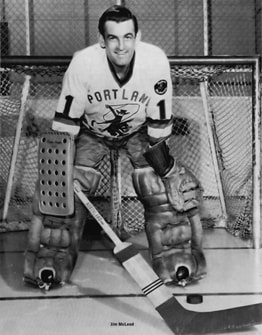 Jim McLeod, circa 1971
Jim McLeod, circa 1971
Goaltender Jim McLeod broke into the Western Hockey League in 1960 playing 7 games for the Seattle Totems due to their regular goalie, Bev Bentley being injured. The amazing thing is that Jimmy (as they call him) wasn't even a professional hockey player yet. Jim was brought in under an emergency ruling due to the need for an immediate replacement for Bev Bentley. When Bentley returned to action, Jim McLeod was sent to the Omaha Knights of the IHL to attain professional status since he was still an amateur at the time of his call-up to the Totems.
Jim then replaced the Totems goalie in October, 1961 and the critics at that time thought the coach of the Totems may have been flirting with disaster by trusting a netminder that only had seven games under his belt in the WHL. However, Jim would prove them wrong in his first game as he sparked Seattle to a 2-2 tie again the Portland Buckaroos. He would even stop the great Gordon Fashoway on a break-away that preserved the tie for the Totems. The article in the paper the next day states that McLeod did almost everything but stop the pucks with his teeth. This statement would hold true throughout Jim's career as his unorthodox, yet effective style made him one of the best goaltenders ever in the Western Hockey League. Jim would play 12 games in 1961-62 for the Seattle Totems and then finish out the season with the Muskegon Zephyrs of the IHL. He would then be traded to the San Francisco Seals in October 1962 for Barney Krake.
For the 1962-63 season Jim posted a record of 43 wins, 23 losses, 1 tie and a 3.01 goals against average while leading his team to the Play-Offs were they would beat the Portland Buckaroos and claim the Lester Patrick Cup, as champions of the WHL. Jim shared with me that his biggest thrill or memory as a player was winning the Lester Patrick Cup that year and then getting kissed by Kim Novak at the presentation ceremony! In September 1963 the Los Angeles Blades would acquire the services of McLeod and he would finish the season with 18 wins, 15 losses and 6 ties while posting a 3.26 GAA. In August 1964 it was the Seattle Totems that would come calling and Jim would remain with them through the 1966-67 season. Jim's performance with the Totems was spectacular and he would establish himself as one of the best goalies in the WHL. He did so by winning the Western Hockey Leagues Leading Goaltender Award (fewest goals against) in 1965 and 1967 with a 2.74 and 2.40 GAA, being named a First Team All-Star in 1965 and winning the Lester Patrick Cup in 1967.
However, on September 12, 1967 the Portland Buckaroos acquired Jim McLeod, by trading Don Head to the Totems. The trade for McLeod gave the Buckaroos a goalie that was four years younger than Head and by then well established as a premier goalie. He had just lead the Totems to the Lester Patrick Cup and had posted a 1.88 average as the Totems swept the playoffs in eight straight games. In addition, Jim had finished the regular season with a 2.44 average, flirting with the WHL all-time record of 2.40. When informed of the trade at his home in Port Arthur, Ontario, McLeod said, "I'm very pleased to be going to Portland, I'll be on my way tomorrow." As with all the other teams Jimmy played for he was a stellar performer in Portland. During his time with the Bucks, Jim won the WHL Leading Goaltender Award in 1968 (sharing it with Marv Edwards), 1969 and 1971 (sharing it with Dave Kelly). He was also a WHL First All-Star in 1969 and a WHL Second All-Star in 1968 and 1971). Jim also set the WHL all time record for goals against average at 2.29 in 42 games in 1968-69. Jim McLeod also was a member of the 1971 Lester Patrick Cup Championship while sharing the goaltending duties with Dave Kelly.
In June, 1971 the St. Louis Blues claimed McLeod in the Inter-League Draft and he appeared in the only 16 games of his NHL career with the Blues in 1971-72, posting an official 6-6-4 record. The Blues seemed uncertain as to who their top goalie was to be that year, rotating no less than five goalies, including McLeod. The others were; Ernie Wakely, Jacques Caron, Peter McDuffe and Wayne Stephenson.
The arrival of the WHA in 1972-73 presented an alternative for players like McLeod, who was drafted by the Chicago Cougars. It was the chance to finally make the kind of money which, until then had exclusively been reserved for those good enough to play in the NHL. He was installed as Chicago's number-one netminder, playing 54 games. In the offseason he was traded to the New York Raiders, but after starting just ten games was traded again to the Los Angeles Sharks. He posted a combined record of seven wins and 20 losses.
McLeod followed the Sharks franchise when it relocated to Michigan for the 1974-75 season and was renamed the Stags but again posted a losing record of 3-6-1. After playing a handful of games in the minors, he retired at the age of 38.
WHL Awards:
WHL (Lester Patrick Cup) Championship:
WHL Leading Goaltender Award (Fewest Goals Against): 1964-65, 1966-67, 1967-1968 (shared w/Marv Edwards), 1968-69, 1970-71 shared with Dave Kelly).
WHL All Star Selection: First Team All Star - 1964-65, 1968-69; Second Team All-Star - 1967-68, 1970-71
Jimmy Mcleod, like many other Portland Buckaroos settled in Portland after his playing days were over.
Jim then replaced the Totems goalie in October, 1961 and the critics at that time thought the coach of the Totems may have been flirting with disaster by trusting a netminder that only had seven games under his belt in the WHL. However, Jim would prove them wrong in his first game as he sparked Seattle to a 2-2 tie again the Portland Buckaroos. He would even stop the great Gordon Fashoway on a break-away that preserved the tie for the Totems. The article in the paper the next day states that McLeod did almost everything but stop the pucks with his teeth. This statement would hold true throughout Jim's career as his unorthodox, yet effective style made him one of the best goaltenders ever in the Western Hockey League. Jim would play 12 games in 1961-62 for the Seattle Totems and then finish out the season with the Muskegon Zephyrs of the IHL. He would then be traded to the San Francisco Seals in October 1962 for Barney Krake.
For the 1962-63 season Jim posted a record of 43 wins, 23 losses, 1 tie and a 3.01 goals against average while leading his team to the Play-Offs were they would beat the Portland Buckaroos and claim the Lester Patrick Cup, as champions of the WHL. Jim shared with me that his biggest thrill or memory as a player was winning the Lester Patrick Cup that year and then getting kissed by Kim Novak at the presentation ceremony! In September 1963 the Los Angeles Blades would acquire the services of McLeod and he would finish the season with 18 wins, 15 losses and 6 ties while posting a 3.26 GAA. In August 1964 it was the Seattle Totems that would come calling and Jim would remain with them through the 1966-67 season. Jim's performance with the Totems was spectacular and he would establish himself as one of the best goalies in the WHL. He did so by winning the Western Hockey Leagues Leading Goaltender Award (fewest goals against) in 1965 and 1967 with a 2.74 and 2.40 GAA, being named a First Team All-Star in 1965 and winning the Lester Patrick Cup in 1967.
However, on September 12, 1967 the Portland Buckaroos acquired Jim McLeod, by trading Don Head to the Totems. The trade for McLeod gave the Buckaroos a goalie that was four years younger than Head and by then well established as a premier goalie. He had just lead the Totems to the Lester Patrick Cup and had posted a 1.88 average as the Totems swept the playoffs in eight straight games. In addition, Jim had finished the regular season with a 2.44 average, flirting with the WHL all-time record of 2.40. When informed of the trade at his home in Port Arthur, Ontario, McLeod said, "I'm very pleased to be going to Portland, I'll be on my way tomorrow." As with all the other teams Jimmy played for he was a stellar performer in Portland. During his time with the Bucks, Jim won the WHL Leading Goaltender Award in 1968 (sharing it with Marv Edwards), 1969 and 1971 (sharing it with Dave Kelly). He was also a WHL First All-Star in 1969 and a WHL Second All-Star in 1968 and 1971). Jim also set the WHL all time record for goals against average at 2.29 in 42 games in 1968-69. Jim McLeod also was a member of the 1971 Lester Patrick Cup Championship while sharing the goaltending duties with Dave Kelly.
In June, 1971 the St. Louis Blues claimed McLeod in the Inter-League Draft and he appeared in the only 16 games of his NHL career with the Blues in 1971-72, posting an official 6-6-4 record. The Blues seemed uncertain as to who their top goalie was to be that year, rotating no less than five goalies, including McLeod. The others were; Ernie Wakely, Jacques Caron, Peter McDuffe and Wayne Stephenson.
The arrival of the WHA in 1972-73 presented an alternative for players like McLeod, who was drafted by the Chicago Cougars. It was the chance to finally make the kind of money which, until then had exclusively been reserved for those good enough to play in the NHL. He was installed as Chicago's number-one netminder, playing 54 games. In the offseason he was traded to the New York Raiders, but after starting just ten games was traded again to the Los Angeles Sharks. He posted a combined record of seven wins and 20 losses.
McLeod followed the Sharks franchise when it relocated to Michigan for the 1974-75 season and was renamed the Stags but again posted a losing record of 3-6-1. After playing a handful of games in the minors, he retired at the age of 38.
WHL Awards:
WHL (Lester Patrick Cup) Championship:
WHL Leading Goaltender Award (Fewest Goals Against): 1964-65, 1966-67, 1967-1968 (shared w/Marv Edwards), 1968-69, 1970-71 shared with Dave Kelly).
WHL All Star Selection: First Team All Star - 1964-65, 1968-69; Second Team All-Star - 1967-68, 1970-71
Jimmy Mcleod, like many other Portland Buckaroos settled in Portland after his playing days were over.
More Player Biographies to be added to this site very soon!
 Buying
Vintage Hockey Memorabilia: Buying vintage hockey memorabilia;
Vintage game used hockey memorabilia, vintage hockey team photos, vintage hockey autographs;
Other rare hockey memorabilia. Vintage game used hockey jerseys, Stanley Cup rings, Vintage hockey trophies. Buying all
vintage NHL, vintage Western Hockey League (WHL) memorabilia. Buying Portland Buckaroos, Portland Eagles, Portland Penguins and Portland Rosebuds
hockey memorabilia. Buying vintage Seattle Metropolitans, Vancouver Millionaires, Victoria Cougars and
old Pacific Coast Hockey League (PCHL) hockey memorabilia. Buying
Vintage Hockey Memorabilia: Buying vintage hockey memorabilia;
Vintage game used hockey memorabilia, vintage hockey team photos, vintage hockey autographs;
Other rare hockey memorabilia. Vintage game used hockey jerseys, Stanley Cup rings, Vintage hockey trophies. Buying all
vintage NHL, vintage Western Hockey League (WHL) memorabilia. Buying Portland Buckaroos, Portland Eagles, Portland Penguins and Portland Rosebuds
hockey memorabilia. Buying vintage Seattle Metropolitans, Vancouver Millionaires, Victoria Cougars and
old Pacific Coast Hockey League (PCHL) hockey memorabilia. |
 Vintage Rare Hockey Memorabilia: 1933-1934 New York Rangers team signed program; 1933 New York Rangers Stanley Cup Championship Players Presentation Photo; 1934 CCM advertising featuring the
1934 Stanley Cup Champion Chicago Black Hawks; 1920's lithograph of Bill Carson of the Toronto Maple Leafs; 1920's lithograph of Nels Stewart of the Montreal maroons; 1930's Lester Patrick's official hockey game; 1935-36 Eddie Shore
and Roy Worters Triumph postcards; 1930's New York Americans and Maple Leafs advertising piece; 1929 Hockey Sheet Music featuring NHL stars; 1939 Frank Boucher signed letter; Vintage Rare Hockey Memorabilia: 1933-1934 New York Rangers team signed program; 1933 New York Rangers Stanley Cup Championship Players Presentation Photo; 1934 CCM advertising featuring the
1934 Stanley Cup Champion Chicago Black Hawks; 1920's lithograph of Bill Carson of the Toronto Maple Leafs; 1920's lithograph of Nels Stewart of the Montreal maroons; 1930's Lester Patrick's official hockey game; 1935-36 Eddie Shore
and Roy Worters Triumph postcards; 1930's New York Americans and Maple Leafs advertising piece; 1929 Hockey Sheet Music featuring NHL stars; 1939 Frank Boucher signed letter;
|
 Vintage Hockey
Autographs, Hockey Autographs: 1933 Maple Leafs program signed by Chuck Gardiner, Charlie
Conacher, King Clancy; Dit Clapper signed 8" x 10" photo; 1946 Frank Boucher signed photo; 1931-32 Boston Bruins signed hockey gloves; 1928-29 New York Americans team signed photo; Lionel Conacher signed 3 x 5; 1937-38 New York Americans Team Signed Letterhead; Lord Stanley, Earl of Derby signed cut; 1933 Chuck Gardiner signed Canadian Chewing Gum card..... Vintage Hockey
Autographs, Hockey Autographs: 1933 Maple Leafs program signed by Chuck Gardiner, Charlie
Conacher, King Clancy; Dit Clapper signed 8" x 10" photo; 1946 Frank Boucher signed photo; 1931-32 Boston Bruins signed hockey gloves; 1928-29 New York Americans team signed photo; Lionel Conacher signed 3 x 5; 1937-38 New York Americans Team Signed Letterhead; Lord Stanley, Earl of Derby signed cut; 1933 Chuck Gardiner signed Canadian Chewing Gum card.....
|
|
|
|
 Vintage Hockey Postcards, Team Postcards and Arenas: 1905 Ottawa Silver Seven team postcard; 1905 Michigan State High School Champions team postcard; 1907 Moncton Victorias Maritime Champions team postcard; 1920's Edmonton Senior Hockey Champions team postcard; 1930 Truro Bearcats team postcard; 1933 and 1934
Allan Cup Champions team postcards; 1938 World Champions Sudbury Wolves team postcard... Vintage Hockey Postcards, Team Postcards and Arenas: 1905 Ottawa Silver Seven team postcard; 1905 Michigan State High School Champions team postcard; 1907 Moncton Victorias Maritime Champions team postcard; 1920's Edmonton Senior Hockey Champions team postcard; 1930 Truro Bearcats team postcard; 1933 and 1934
Allan Cup Champions team postcards; 1938 World Champions Sudbury Wolves team postcard... |
 Pacific Coast Hockey League Memorabilia: 1921 Pacific Coast Hockey Association (PCHA)Weekly news - Vancouver Millionaires and
Seattle Metropolitans; 1929-30 Portland Buckaroo team photos; 1934-35 Portland Buckaroos team photos; Calgary Falcons goalie photo; Portland Buckaroos program................. Pacific Coast Hockey League Memorabilia: 1921 Pacific Coast Hockey Association (PCHA)Weekly news - Vancouver Millionaires and
Seattle Metropolitans; 1929-30 Portland Buckaroo team photos; 1934-35 Portland Buckaroos team photos; Calgary Falcons goalie photo; Portland Buckaroos program.................
|
 Hockey memorabilia from Murray Murdoch, Rangers Legend: Murray Murdoch's 300th hockey game presentation watch; 500th hockey game presentation plaque; Vintage New York Rangers team and individual photos; 1931-32 and 1932-33 Rangers team photo postcards; Ching Johnson autographed photo; Murray's Midget Team and College hockey team photos.... Hockey memorabilia from Murray Murdoch, Rangers Legend: Murray Murdoch's 300th hockey game presentation watch; 500th hockey game presentation plaque; Vintage New York Rangers team and individual photos; 1931-32 and 1932-33 Rangers team photo postcards; Ching Johnson autographed photo; Murray's Midget Team and College hockey team photos....
|
 Vintage NHL Team Photos: 1930-31 Montreal Canadiens team; 1930-31 Chicago Black Hawks; 1931-32 Toronto Maple Leafs; 1931-32 New York
Rangers; 1932-33 Montreal Maroons British Consols team photo; 1933-34 Toronto Maple Leafs;1933-34 Chicago Blackhawks; 1934-35 Montreal Maroons; 1939-40 New York Rangers; 1940-41 New York Americans; 1941-42 Brooklyn Americans...... Vintage NHL Team Photos: 1930-31 Montreal Canadiens team; 1930-31 Chicago Black Hawks; 1931-32 Toronto Maple Leafs; 1931-32 New York
Rangers; 1932-33 Montreal Maroons British Consols team photo; 1933-34 Toronto Maple Leafs;1933-34 Chicago Blackhawks; 1934-35 Montreal Maroons; 1939-40 New York Rangers; 1940-41 New York Americans; 1941-42 Brooklyn Americans......
|
 Vintage NHL Hockey Wire and Press Photos:
Vintage hockey photos featuring the Boston Bruins great Dit Clapper and Frank Brimsek; 1930's Boston Bruins media guide photos; Hockey wire photos of Eddie Shore, Frank Brimsek, Ching Johnson, Bill Cook
and many other Hockey Hall of Fame players and other greats of the game. Vintage NHL Hockey Wire and Press Photos:
Vintage hockey photos featuring the Boston Bruins great Dit Clapper and Frank Brimsek; 1930's Boston Bruins media guide photos; Hockey wire photos of Eddie Shore, Frank Brimsek, Ching Johnson, Bill Cook
and many other Hockey Hall of Fame players and other greats of the game. |
| Links to Hockey Collectors, Hockey memorabilia Dealers and Other Hockey Web Sites: Links to other hockey memorabilia sites including vintage hockey memorabilia dealers and other hockey memorabilia collectors sites. Also links to a variety of other sites that are full of historical information along with great shopping sites and other link partners. |
|
| copyright@2022 All hockey memorabilia and their images are the exclusive property of the owner and may not be reprinted, copied or used without written permission from the owner. For licensing or other questions please contact [email protected]
| |||||
